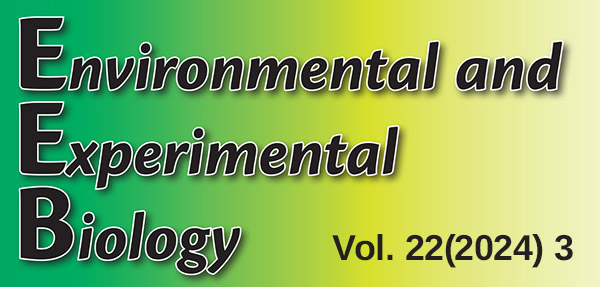‘Tortured phrases’ impact the integrity of the environmental literature
DOI:
https://doi.org/10.22364/eeb.22.14Keywords:
errors, established jargon, ethics, misconduct, retractions, scientific communication and errorAbstract
In environmental science, it is necessary to accurately describe processes, methods and phenomena using established technical terms and jargon. Any significant deviation from such terms might leave readers and peers confused, while confusion can lead to misinterpretations, opening up the possibility of errors. During peer review and prior to publication in a peer-reviewed environmental journal, it is thus incumbent upon editors and peer reviewers, and to a lesser extent copy editors, to verify that terminology in a scientific paper is accurate. In this brief communication, 61 papers with cases of ‘tortured phrases’, which are terms that have – for some reason – come to replace established jargon, are described in indexed environmental literature, frequently in indexed journals that are generally associated with reputable publishers. Of the 61 papers, 13 have been retracted, suggesting an erosion of the papers’ integrity. Awareness of this phenomenon and these cases allows editors and peer reviewers of environmental journals to be more careful when screening and vetting submitted papers, but should also serve as a lesson for authors to be more careful when writing their papers, avoiding the temptation to automatically incorporate text that online text thesauruses may provide, or to use non-standard terms.
References
Cabanac G., Labbé C., Magazinov A. 2021. Tortured phrases: A dubious writing style emerging in science. Evidence of critical issues affecting established journals. arXiv https://doi.org/arXiv:2107.06751v1. /preprint, not peer reviewed/
Huberts L.W.J.C. 2018. Integrity: What it is and why it is important. Public Integr. 20: S18–S32.
Kueffer C., Larson B.M.H. 2014. Responsible use of language in scientific writing and science communication. BioScience 64: 719–724.
Maddi A., Monneau E., Guaspare-Cartron C., Gargiulo F., Dubois M. 2024. Streetlight effect in PubPeer comments: Are open access publications more scrutinized? Scientometrics 129: 4231–4247.
Magazinov A. 2023. Environmental Pseudoscience and Polluted Research. https://forbetterscience.com/2023/11/28/environmental-pseudoscience-and-polluted-research/ (28 November 2023; last accessed: 16 September 2024)
Olson M.E., Arroyo-Santos A., Vergara-Silva F. 2019. A user’s guide to metaphors in ecology and evolution. Trends Ecol. Evol. 34: 605–615.
Orrall A. 2024. Sleuths spur cleanup at journal with nearly 140 retractions and counting. https://retractionwatch.com/2024/08/22/sleuths-spur-cleanup-at-journal-with-nearly-140-retractions-and-counting/ (22 August 2024; last accessed: 16 September 2024)
Robinson T., Cadzow L., Kirby N. 2018. Investigating integrity: A multi-disciplinary literature review. Working paper. University of Oxford. https://integrity.bsg.ox.ac.uk/sites/default/files/integrity_literature_review_wp_05_2018.pdf (May 2018; last accessed: 16 September 2024)
Roe J., Perkins M. 2022. What are automated paraphrasing tools and how do we address them? A review of a growing threat to academic integrity. Int. J. Educ. Integr. 18: 15.
Teixeira da Silva J.A. 2022. Tortured phrases dilute the specificity of medical jargon. J. Health Soc. Sci. 7: 137–140.
Teixeira da Silva J.A. 2023a. ‘Tortured phrases’ in preprints. Cur. Med. Res. Opin. 39: 785–787.
Teixeira da Silva J.A. 2023b. Authors disagreeing with retractions: A growing procedural concern? Persona y Bioética 27: e2726.
Teixeira da Silva J.A. 2024a. The theoretical crisis of trust in science is becoming science’s practical crisis: Perspective through the eyes of citations. J. Clin. Med. Kazakhstan 21: 4–6.
Teixeira da Silva J.A. 2024b. “CRISPR” mutations: inaccurate linguistic variations and misrepresentation of the CRISPR acronym. CRISPR J. 7: 3–4.
Teixeira da Silva J.A. 2024c. “Corrosive” acids, inaccurate forms of salicylic, jasmonic, gibberellic and abscisic acids, in the plant literature. Vegetos https://doi.org/10.1007/s42535-023-00772-5. /in press/
Teixeira da Silva J.A. 2024d. Copy editors can play a role in the detection and elimination of “tortured phrases”. Sci. Editor https://doi.org/10.36591/SE-4703-22. /in press/
Teixeira da Silva J.A., Daly T., Türp J.C., Sabel B.A., Kendall G. 2024. Undeclared use of third party service providers in academic publishing is unethical: An epistemic reflection and scoping review. Naunyn-Schmiedeberg’s Arch. Pharmacol. https://doi.org/10.1007/s00210-024-03177-6. /in press/
Yeo-Teh N.S.L., Tang B.L. 2022. Sustained rise in retractions in the life sciences literature during the pandemic years 2020 and 2021. Publications 10: 29.
Downloads
Published
Issue
Section
License
Copyright (c) 2024 University of LatviaThis is an open access journal which means that all content is freely available without charge to the user or his/her institution. Users are allowed to read, download, copy, distribute, print, search, or link to the full texts of the articles in this journal without asking prior permission from the publisher or the author. This is in accordance with the BOAI definition of open access. Author(s) of the published papers retain copyright, the papers are made freely available for non-commercial purposes, allowing download, reuse, reprint and distribution of the material as long as the original authors and the source are cited. This license is equivalent to the CC BY-NC-ND.


